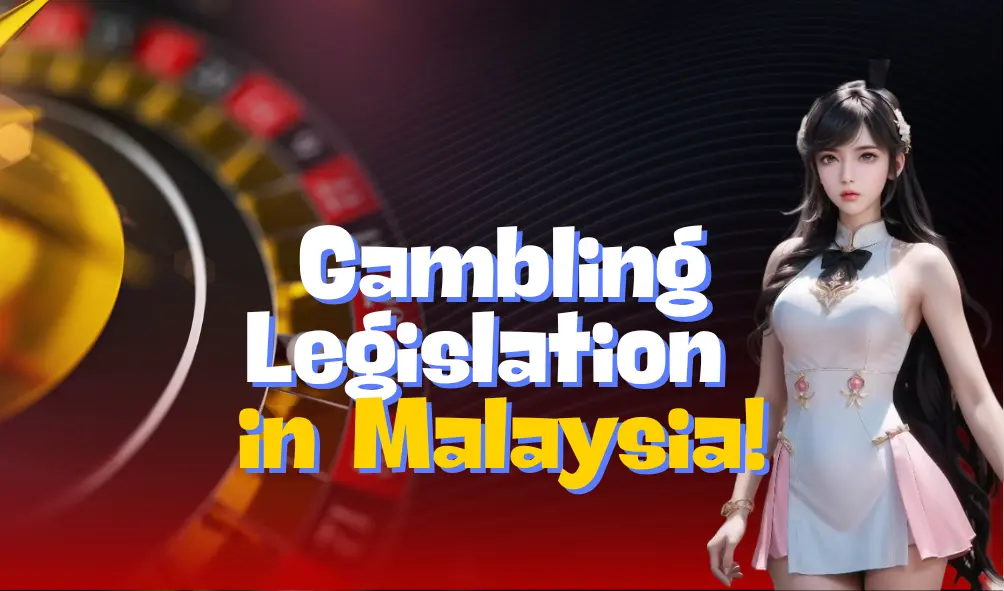Gambling Legislation in Malaysia
Introduction
Gambling has been a part of Malaysian society for centuries. Various forms of traditional and modern gambling activities coexist across the country. However, the legal landscape surrounding gambling in Malaysia has been complex and ever-evolving, reflecting the country’s cultural, religious, and economic dynamics. This article delves into the intricate world of gambling legislation in Malaysia, examining its historical context, the current regulatory framework, the different types of legal gambling, the impact on society and the economy, and the measures taken to promote responsible gambling practices.

Historical Context
The Influence of Cultural and Religious Beliefs
Gambling in Malaysia has deep roots, with traditional games such as “chap ji kee” and “dadu” being practiced for generations. However, the acceptance and legality of gambling have been heavily influenced by the country’s cultural and religious landscape. Malaysia is a multicultural society with a predominantly Muslim population, as well as significant Buddhist, Hindu, and Christian communities. The Islamic faith, which is the authorized religion of the country, has a generally negative view towards gambling, considering it a form of “may” or gambling, which is prohibited.
The Evolution of Gambling Legislation
The evolution of gambling legislation in Malaysia can be traced back to the colonial era. During British rule, gambling was initially legalized and regulated, with the establishment of the first legal casinos in the country. However, as the country gained independence in 195. The government began to take a more restrictive approach towards gambling. Driven by the growing influence of Islamic principles and the desire to maintain social order.
In the 1960s and 1970s, the government introduced laws and regulations to manage and limit gambling activities. The Common Gaming Houses Act of 1953 and the Betting Act of 1953 were critical pieces of legislation that criminalized unauthorized gambling and empowered law enforcement agencies to break down illegal operations.
The 1980s and 1990s saw a shift in the government’s approach with the introduction of more regulated forms of gambling. In 1989, the government established the Magnum Corporation. A state-owned lottery company that was granted a monopoly on legal lottery operations in the country. This move was seen as a way to generate revenue for the government while maintaining control over the gambling industry.
The 1980s and 1990s saw a shift in the government’s approach with the introduction of more regulated forms of gambling. In 1989, the government established the Magnum Corporation, a state-owned lottery company that was granted a monopoly on legal lottery operations in the country. This move was seen as a way to generate revenue for the government while maintaining control over the gambling industry.
Today, the legal framework governing gambling in Malaysia is a patchwork of various laws and regulations, including the Common Gaming Houses Act, the Betting Act, the Horse Racing Act, and the Lotteries Act. The enforcement of these laws is primarily the responsibility of the Royal Malaysian Police and the Royal Malaysian Customs Department.
Regulatory Framework
Current Laws and Regulations
The current legal framework governing gambling in Malaysia consists of several essential laws and regulations:
- Common Gaming Houses Act 1953 prohibits the operation of “common gaming houses” or unauthorized gambling establishments. It also empowers law enforcement agencies to raid and shut down such establishments.
- Betting Act 1953: This act regulates and controls betting activities, including sports betting and other forms of wagering.
- Lotteries Act 1952 governs the operation of legal lotteries in the country, including the state-run lottery, Magnum.
- Horse Racing Act 1961: This act regulates the operation of horse racing and betting activities related to horse racing.
Regulatory Bodies and Enforcement Measures
The primary regulatory body overseeing Malaysia’s gambling industry is the Ministry of Finance. The ministry is responsible for issuing licenses and permits for various gambling activities and enforcing the relevant laws and regulations.
The Royal Malaysian Police and the Royal Malaysian Customs Department are the central enforcement agencies tasked with combating illegal gambling activities. These agencies conduct regular raids and operations to shut down unauthorized gambling establishments and arrest those involved in illegal gambling operations.
The Ministry of Home Affairs regulates and monitors gambling activities, particularly public order and social concerns.
Types of Legal Gambling
Land-based Gambling
The legal forms of land-based gambling in Malaysia are limited and tightly controlled. The country has only one licensed casino, located on the island of Sentosa, operated by Resorts World Genting. This casino offers various gambling activities. Including table games, slot machines, and sports betting.
In addition to the Resorts World Genting casino, a few licensed horse racing tracks, and off-track betting facilities are nationwide. These facilities are regulated under the Horse Racing Act 1961. They offer pari-mutuel betting on horse races.
Online Gambling
Online gambling is not explicitly legalized in Malaysia. The country has taken a relatively strict stance towards it. The existing laws, such as the Common Gaming Houses Act and the Betting Act, are interpreted to encompass online gambling activities, making them illegal.
Despite the legal restrictions, there is a thriving underground market for online gambling in Malaysia. Many Malaysian citizens access offshore gambling platforms through virtual private networks (VPNs) or other means. The government has made efforts to block access to these offshore sites, but the nature of the internet makes it challenging to eliminate the problem.
Lottery and Sports Betting
The state-run lottery, Magnum, is Malaysia’s only legal form of lottery. Magnum offers a variety of lottery games, including popular draws such as the 4D and Toto, and is regulated under the Lotteries Act 1952.
Sports betting is another legal gambling activity in Malaysia. It is limited to licensed horse racing tracks and off-track betting facilities. Bets can be placed on horse races, both domestically and internationally.
Impact on Society and Economy
Social and Economic Implications
Gambling has had a significant impact on Malaysian society, both in terms of social and economic implications. On the positive side, the legal gambling industry has generated substantial revenue for the government, contributing to the country’s economic development. For example, the Resorts World Genting casino is a significant tourist attraction and employer, contributing to the local economy.
However, the negative social consequences of gambling have also been a concern. Problem gambling and addiction can lead to financial difficulties, family breakdowns, and other social ills. The government has recognized these issues and has taken steps to address them through responsible gambling measures and support services for those struggling with addiction.
Revenue and Contribution to the Economy
The gambling industry in Malaysia generates significant revenue for the government. In 2019, the state-run lottery operator Magnum reported income of over RM2.8 billion (approximately USD 670 million), with the government receiving a substantial portion of this through taxes and dividends.
The Resorts World Genting casino is also a significant contributor to the Malaysian economy, generating revenue and employment opportunities. In 2019, the casino reported revenue of over RM9.1 billion (approximately USD 2.2 billion), making it one of the most significant contributors to the country’s tourism and hospitality sectors.
Potential Benefits and Drawbacks of Legalization
The debate over the legalization and expansion of the gambling industry in Malaysia is an ongoing one, with proponents arguing for the potential economic benefits. At the same time, critics raise concerns about the social costs.
Potential Benefits:
- Increased tax revenue and economic growth from a controlled gambling industry
- Job creation and support for the tourism and hospitality sectors
- Opportunities for investment and development of integrated resort complexes
Potential Drawbacks:
- Increased risk of problem gambling and addiction, leading to social and financial problems
- Concerns about the impact on public morals and social well-being
- Potential for corruption and money laundering within the industry
The government has to carefully weigh these considerations and strike a balance between promoting economic development and safeguarding the well-being of its citizens.
Responsible Gambling Measures
Responsible Gambling Initiatives
To handle the possible negative impacts of gambling, the Malaysian government has implemented various responsible gambling initiatives. These include:
- Problem Gambling Support Services: The government has established support services, for example, counseling and treatment programs, to help individuals struggling with gambling addiction.
- Public Awareness Campaigns: Awareness campaigns have been launched to educate the public on the risks of problem gambling and promote responsible gambling practices.
- Regulations and Age Restrictions: The government has implemented regulations, such as minimum age requirements, to limit access to gambling activities and protect vulnerable individuals.
- Collaborative Efforts: The government works closely with the gambling industry, community organizations, and other stakeholders to develop and implement responsible gambling strategies.
Support Services and Resources
The government-funded Counseling and Rehabilitation Centre (CRC) primarily provides support services for individuals affected by problem gambling in Malaysia. The CRC offers counseling, treatment programs, and referrals to specialized services.
In addition, various non-governmental organizations (NGOs) and community groups also provide support and resources for individuals and families dealing with gambling-related issues. These include hotlines, support groups, and educational programs.
The government collaborates with the gambling industry to promote responsible gambling practices. They implement self-exclusion programs, allowing people to voluntarily exclude themselves from gambling activities.
Conclusion
Gambling legislation in Malaysia has evolved over the years, reflecting the country’s complex cultural, religious, and economic dynamics. While the government has taken a relatively restrictive approach towards gambling, the industry continues to impact the Malaysian economy and society substantially.
With its mix of laws and enforcement measures, the current regulatory framework aims to control gambling activities while generating revenue. However, addressing the social and ethical concerns associated with gambling remains a challenge, particularly with the growing availability of online gambling options.
The Malaysian government must continue promoting responsible gambling practices, strengthening regulatory oversight, and finding ways to mitigate the negative consequences of gambling while maximizing its potential economic benefits. This delicate balance will be crucial in shaping the future of Malaysia’s gambling industry.










